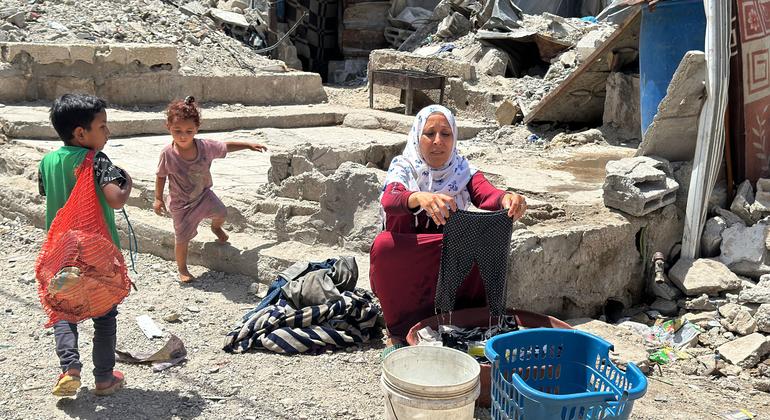Polio stalks Gaza residents as ‘anarchy’ spreads, humanitarians warn


In a statement, Christian Lindmeier, a spokesman for the World Health Organization (WHO), said vaccine-derived poliovirus type 2 (VDPV2) was detected at six locations in wastewater samples collected on June 23 from Khan Younis and Deir al Balah.
So far, no one in Gaza has been treated for paralysis or other symptoms caused by polio infection.
“It is important to note that at this time the virus has only been isolated from the environment; no cases of paralysis have been associated with it,” he told journalists in Geneva. As part of the response, WHO in the Occupied Palestinian Territory has been working with local health authorities, the United Nations Children’s Fund (UNICEF).UNICEF), United Nations agency for Palestine refugees (UNRWA) and partners to assess the extent of polio virus transmission.
The work will identify measures needed to prevent any further spread, “including timely vaccination campaigns,” a WHO spokesperson explained.
White Flag
Meanwhile, the United Nations human rights office in the Occupied Palestinian Territories (OHCHR OPT) described evidence that Gazans continue to suffer “a lot” as some “raise the white flag” as they move to find shelter.
“People continue to move from north to south even though they know the journey is fraught with danger,” said Ajith Sunghay, head of OHCHR OPT.I saw a motorbike and a trailer full of personal belongings smoldering on the road. There were no dead bodies. But it was clear that no one could have survived the attack.On the same road, I saw a bloody donkey cart also loaded with personal belongings. It was also abandoned. It is still unclear why and who carried out these attacks.”
The UN human rights officer has described the impact of “Israel’s destruction” of the enclave’s ability to maintain public order and safety in Gaza.Our office has documented alleged unlawful killings of local police and aid workers, and the choking off of supplies essential to the survival of civilians. Anarchy is widespread.”
“The hostile environment of war and the breakdown of civil order also pose enormous challenges to any meaningful humanitarian response to the enormous needs of the population.”
Polio eradication hampered
Thanks to a comprehensive vaccination campaign, wild polio was eradicated from Gaza more than 25 years ago; pre-war vaccination coverage reached 95% in 2022, according to WHO.
But more than nine months of war, continued mass displacement and “the destruction of the health system, lack of security, barriers to access, continued population displacement, shortages of medical supplies, poor water quality and poor sanitation” have created “perfect environment” for Vaccine-preventable diseases will spread – polio is just one of them. – WHO’s Christian Lindmeier notes.
According to a UN health official, only 16 of Gaza’s 36 hospitals are currently partially operational and 45 of 105 primary health care facilities are operational. He said that only a ceasefire could rapidly expand vaccination activities “to address gaps left by the ongoing fighting.”
From WHO’s global polio eradication programme, Communications Officer Oliver Rosenbauer explains that polio virus can emerge in areas where low vaccination rates allow for a weaker form of the oral vaccine virus. to transform into a stronger version capable of causing paralysis.
“We have genetic markers that indicate when that happens. And so these isolates that we found… were genetically mutated to the point where they could cause paralysis,” he said. “It’s not a wild type (virus) but it’s still a poliovirus in the sense that it can cause the same paralysis.”
Increased funding
In a related development, the head of UNRWA welcome The UK’s decision to continue funding the agency “comes at a critical time when the Agency continues to come under intense and unprecedented attack”.
Sixteen countries have cut $450 million in funding from the UN agency following unproven allegations that staff were linked to terrorist organizations, following the Hamas-led terror attacks on multiple Israeli targets on October 7 that killed some 1,200 people and took more than 250 hostages. Only the United States has yet to reverse its funding decision for UNRWA.
An online post on Friday by UNRWA Director-General Philippe Lazzarini highlighted the “lifesaving and human development work” of the agency’s teams, who represent the main aid provider to millions of Palestinians in Gaza and the region.
Mr. Lazzarini also reiterated his commitment to implementing the 50 recommendations of the an independent report on UNRWAprompted by Israel’s accusations of links to terrorism.


